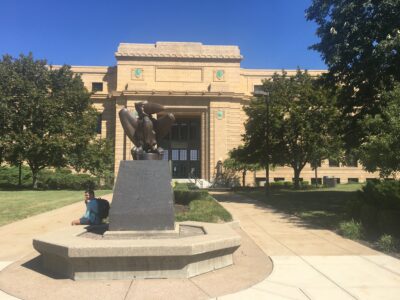KU proposing 5% increase in tuition rates for upcoming school year; other state schools also seeking hikes

photo by: Kim Callahan/Journal-World
Strong Hall on the University of Kansas campus is pictured in September 2021.
Leaders of the University of Kansas are seeking a 5% increase in tuition rates for the next school year.
And they are not alone, as every Regents university in the state is proposing a similar increase after the Kansas Legislature approved a budget that did not provide as much money for employee raises and inflation as once expected.
The Kansas Board of Regents — which oversees KU, K-State, Emporia State, Wichita State, Fort Hays State and Pittsburg State — is scheduled to give preliminary approval to the tuition increases at its meeting on Wednesday.
KU’s proposed 5% increase would be the first tuition increase for the university since the 2018-2019 school year.
Details about the proposed increase — including proposals to increase specific student fees — weren’t immediately available on Monday. The Regents did not release that information as part of their agenda for Wednesday’s meeting, but the Journal-World has requested the documents to get a fuller picture of the tuition and fee proposals.
But KU Chief Financial Officer Jeff DeWitt told the Journal-World that the impact that inflation has had on the university’s operating budget is a major factor in the request. He estimated that if KU did not increase tuition at all, it would require a $12 million reduction in its base operating budget.
“That would be a big problem,” DeWitt said.
Regents universities did ask the Legislature to provide state funding to cover the impact inflation has had on the operating budgets of universities. But that funding wasn’t part of the budget approved by lawmakers in recent weeks. Higher education leaders nationally are estimating inflation increased operating costs at universities in 2022 by 5.2% and are projecting a 3.6% increase in 2023.
Another request that didn’t get fully funded in the state budget for fiscal year 2024 is a recommendation by the governor to provide a 5% increase in the funding pool for merit raises for university faculty and staff. Instead, the Legislature funded merit pool increases at a 2.5% rate.
That means average wage increases at KU likely will be about 2.5% instead of 5% next year. Even if KU gets approval to raise tuition by 5%, DeWitt said it was unclear whether KU would be able to afford a 5% wage increase for employees. He said the issue would get further evaluation, but the 5% tuition increase doesn’t appear to be enough to cover a 5% wage increase.
DeWitt said KU would need to propose a tuition increase near 7% to fully fund the pay plan and other items that were originally part of the proposed budget. But DeWitt said KU leaders were convinced that such a tuition increase would be too steep and would make KU less competitive with other universities in the region.
With the proposed 5% tuition increase, KU expects its tuition costs to remain near the middle of the pack of other universities in the region. DeWitt said there are indications that many universities in the region are proposing tuition increases for the new school year.
Every Regents university in the state is proposing at least a 5% increase in tuition rates. The rate increase could be a shock to some students and their families. Tuition rates were frozen during the last school year, and most schools have gone at least two years without a tuition increase. Here’s a look at the proposed tuition increases for each school and the last year that tuition was increased at each university.
• KU: 5% increase, first since 2018-2019 school year;
• KSU: 5%, first since 2021-2022 school year;
• WSU: 5.9%, first since 2020-2021 school year;
• ESU: 5%, first since 2020-2021 school year;
• PSU: 5%, first since 2020-2021 school year;
• FHSU: 7%, first since 2020-2021 school year.
If approved, the tuition increases would come at a time when state leaders have generally been spending more on higher education funding than in past years. While the employee compensation and inflation relief portions of the Regents budget request wasn’t fully funded this legislative session, lawmakers did approve an $8.5 million enhancement in funding for student scholarships and student success programs, $5 million for cybersecurity improvements and $30 million to address deferred maintenance of university buildings. But DeWitt noted that many of those new dollars are specifically earmarked by the Legislature for specific uses and can’t be applied to the general operating budget. Many of the dollars are also one-time dollars that can’t be used to fund ongoing expenses, like wages.
There’s no guarantee that the Regents will approve the proposed tuition increases. In past years, the Regents have been reluctant to approve tuition increases because they’ve feared that state lawmakers will frown upon tuition increases and simply decrease the state funding that they provide to the schools.
DeWitt said KU is prepared to argue that the tuition increases are important to improving the university.
“I think we have a very compelling case about how we can move KU to a really good place, and this is one of the things we need to do to get there,” DeWitt said.







